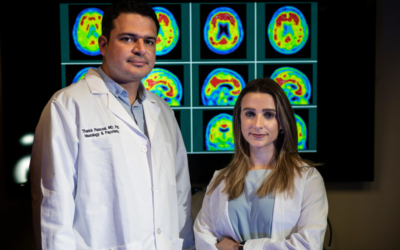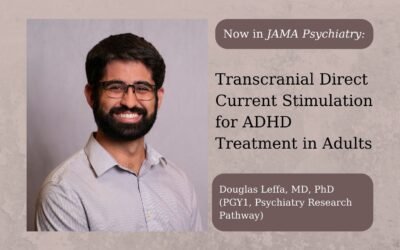Over the Span of AD, Roles of Astrocytes and Microglia Change
As neuronal supporters and immune surveyors, astrocytes and microglia are no mere bystanders to the neuronal mayhem that unfolds in Alzheimer’s disease. At the AD/PD meeting, held March 5-9 in Lisbon, scientists presented new twists on the relative contributions of...
Brain Inflammation May Trigger Alzheimer’s-Linked Anger, Anxiety
Alzheimer’s patients are notoriously irritable, agitated and anxious – and researchers now think they know why. Brain inflammation appears to influence the mood problems of Alzheimer’s patients, rather than traditional markers of the disease like amyloid beta or tau...
Irritability, Agitation and Anxiety in Alzheimer’s Patients Caused by Brain Inflammation, Pitt Study Says
Common neuropsychiatric symptoms that doctors see in Alzheimer’s disease patients originate from brain inflammation rather than amyloid and tau proteins, report University of Pittsburgh School of Medicine researchers today in JAMA Network Open. The finding strengthens...
New research could be game-changer for early detection of Alzheimer’s Disease
The Alzheimer's Association says the disease is a growing public health crisis in PA. Major steps are being taken here in Allegheny County, whether it's addressing under-represented communities, or helping with early detection. Link:...
Alzheimer’s & Dementia and Nature Aging: New Alzheimer’s Disease Research
The Pascoal Lab (PI: Tharick Pascoal, MD, PhD; Associate Professor of Psychiatry and Neurology) and colleagues have published recent research findings in Alzheimer's & Dementia and Nature Aging examining biomarkers and...
Advancing Against Alzheimer’s
Two older adults check in at the hospital to undergo brain scans. Their results are remarkably similar. Both show an accumulation of amyloid plaques—proteins that clog the spaces between neurons and serve as a telltale sign of Alzheimer’s disease. But, as time...
Finding a Biomarker for Alzheimer’s Disease
In this UPMC Physician Journal feature, meet Tharick Pascoal, MD, PhD, neurologist and associate professor of Neurology and Psychiatry at the University of Pittsburgh School of Medicine, as he and his team conduct research to find a biomarker based on tau proteins in...
Best Life: Researchers link ADHD, alzheimers
More than 6.5 million people are living with Alzheimer’s in the United States. More than six million children have attention-deficit/hyperactivity disorder or ADHD. One is usually diagnosed later in life, and the other is diagnosed earlier, but could the two actually...
Exploring a Connection Between ADHD and Alzheimer’s
New research has shed light on the connection between attention deficit-hyperactivity disorder (ADHD) and Alzheimer’s, two neurological conditions that manifest in very different ways. One study showed that people who are genetically predisposed to ADHD may be...
New Alzheimer’s blood test may determine who is at risk of dementia: ‘Could be game changer’
A blood test may help identify individuals at risk for Alzheimer’s before they show any signs of the disease, according to a new study published in the journal Nature Medicine. The blood test looks at the activity of star-shaped brain cells in the blood...
Brain Cell Biomarker for Preclinical Alzheimer Disease Identified
Astrocytes, cells that are involved in the brain’s support system, might play an important role in the progression of Alzheimer disease, according to results from 1016 participants with and without amyloid-β pathology who were all cognitively unimpaired....
In Amyloid Cascade, Do Reactive Astrocytes Bridge Plaques and Tangles?
Why do some people with amyloid plaques decline, while others do not? In the May 29 Nature Medicine, researchers led by Tharick Pascoal at the University of Pittsburgh laid some of the blame on reactive astrocytes. Among cognitively healthy people with amyloid...
Microglial and Astrocyte Reactivity Are Key to Determining Alzheimer’s Disease Progression
Tharick Pascoal, MD, PhD (Associate Professor of Psychiatry) is an internationally recognized expert on the imaging and fluid biomarkers of Alzheimer’s disease and related dementias. He recently published two papers examining the multifaceted but interactive...
Alzheimer’s blood test edges closer as key brain cell identified
A blood test that can detect people at early risk of Alzheimer’s is a step closer after scientists implicated a key brain cell in the development of the disease. As well as providing the basis for a test, their work points to a resolution of one of the persistent...
Prick of the bunch: Blood test can predict who’ll develop Alzheimer’s disease, ‘game-changing’ study suggests
Scientists may have found the true cause of Alzheimer's disease — and believe the condition can be detected using a simple blood test. Experts have long known the build-up of amyloid in the brain is linked to the disease, but whether the plaques are a cause...
New Research from Pitt Psychiatry on Alzheimer’s Disease Biomarkers
Department of Psychiatry investigators focused on Alzheimer’s Research—Victor Villemagne, MD (Professor of Psychiatry); Tharick Pascoal, MD, PhD (Associate Professor of Psychiatry and Neurology); and Thomas Karikari, PhD (Assistant Professor...
Microglia Conflicted: To Help, or to Hinder, Tau’s March Across the Brain?
Do microglia thwart neurodegenerative disease, or help it along? Do they keep amyloid in check with one hand, while goading tau entanglement with the other? Do they protect neurons early on in disease, but sour into synaptic slayers later? As the field gears up to...
University of Pittsburgh School of Medicine Promotes Tharick Pascoal, MD, PhD, to Associate Professor of Psychiatry
We are delighted to announce that Tharick Pascoal, MD, PhD, has been promoted to Associate Professor of Psychiatry by the University of Pittsburgh School of Medicine. Dr. Pascoal received his MD from Federal University of Pelotas in Brazil. He...
Genetic risk of ADHD may boost odds of Alzheimer’s in old age
Having a genetic predisposition to attention-deficit/hyperactivity disorder, or ADHD, is associated with cognitive decline and may predict Alzheimer's disease in old age, early research released Thursday suggests. Recent large studies have hinted at a link between...
Transcranial Direct Current Stimulation vs Sham for the Treatment of Inattention in Adults
Attention-deficit/hyperactivity disorder (ADHD) is a neurodevelopmental condition that affects 2.5% of adults worldwide. Pharmacotherapy is the recommended initial treatment for most adults, but patient adherence can be low due to adverse effects and other concerns....


















